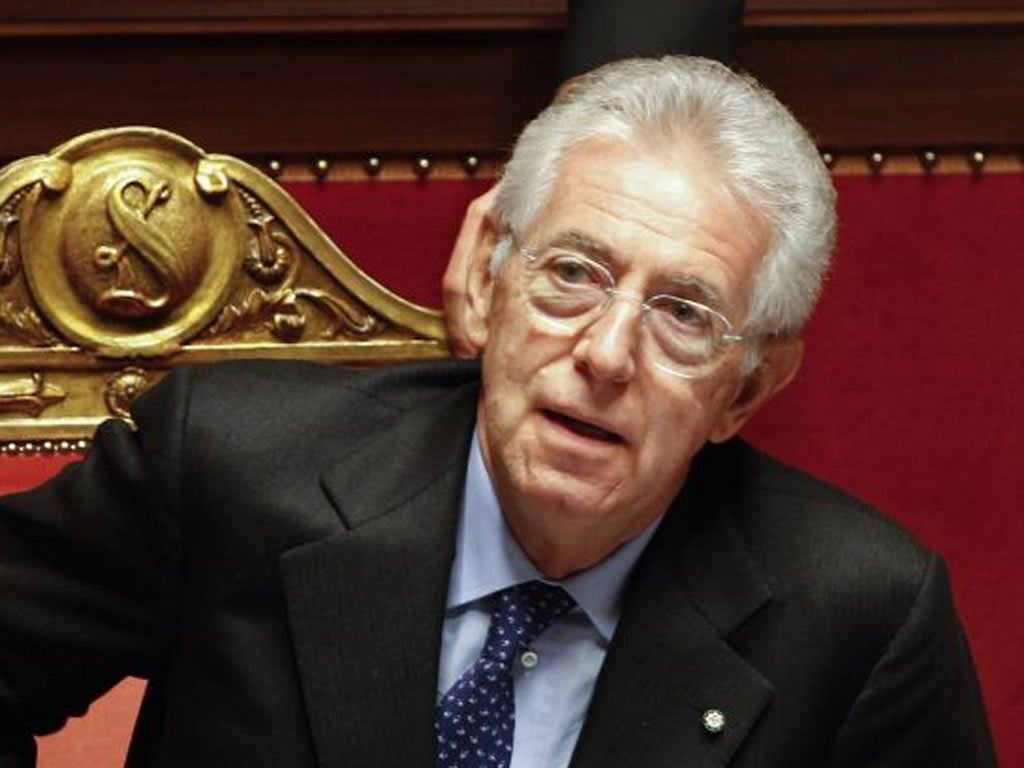Italian leader Mario Monti wins second confidence vote

Your support helps us to tell the story
From reproductive rights to climate change to Big Tech, The Independent is on the ground when the story is developing. Whether it's investigating the financials of Elon Musk's pro-Trump PAC or producing our latest documentary, 'The A Word', which shines a light on the American women fighting for reproductive rights, we know how important it is to parse out the facts from the messaging.
At such a critical moment in US history, we need reporters on the ground. Your donation allows us to keep sending journalists to speak to both sides of the story.
The Independent is trusted by Americans across the entire political spectrum. And unlike many other quality news outlets, we choose not to lock Americans out of our reporting and analysis with paywalls. We believe quality journalism should be available to everyone, paid for by those who can afford it.
Your support makes all the difference.Italian Premier Mario Monti insisted he intended to govern until elections in 2013, urging lawmakers not to "pull the plug" before then no matter how politically painful the measures in his plan to save the country from its debt crisis.
Monti spoke just before his new government won its second parliamentary confidence vote with a tally of 556-61 in the lower Chamber of Deputies. On Thursday, Monti's government won in the Senate, confirming his government's mandate.
Monti said he hoped to soon present a package of reforms to parliament and said he would travel to Brussels next week to map out his strategy to reduce debt and spur growth to the European Commission.
He also has a meeting planned Thursday in Strasburg with the French and German leaders, the first of what he said is a new, permanent grouping of the eurozone's three largest economies.
"The job that I have had the honor of receiving is nearly impossible, but we will succeed," Monti told lawmakers.
Monti is under enormous pressure to boost growth and bring down Italy's high debt, which at 120 percent of GDP is among the highest in the eurozone. The aim is not only to save Italy from succumbing to the debt crisis but to prevent a catastrophic disintegration of the common euro currency.
Monti's strategy focuses on budgetary rigor, economic growth and social fairness. He pledged to reform the pension system, re-impose a tax on homes annulled by Berlusconi's government, fight tax evasion, streamline civil court proceedings, get more women and youth into the work force and cut political costs.
He said he hoped to present the measures as a package, but gave no details or timetable Friday.
His remarks Friday were more aimed at answering lingering doubts among those who voted against his government, have conditioned their approval on how long it lasts, or took to the streets Thursday to protest his cabinet of bankers, university professors and CEOs.
"We won't be around for long," Monti said. "We won't last a minute longer than the time this parliament gives us their confidence."
But he stressed that he never would have gathered together such a high-caliber government if the intent wasn't to govern until the natural end of the legislative term, in spring 2013. He has said anything less than that would undermine the government's credibility.
While acknowledging the absolute dependence of his government on parliament, he jokingly asked to avoid using terms like "pull the plug" because it implied the government was some kind of an "artificial lung" when in fact it is leading the country through a profound crisis.
"We're not asking for blind trust, but vigilant trust," Monti said.
But he also issued a warning of sorts, noting the sense of desperation among ordinary Italians about Italy's economic mess: "In giving us confidence or taking it away, you must also realize the consequences for yourselves among Italians."
It was a clear message to Berlusconi's People of Freedom party, which has said it would only support Monti's government for as long as needed to pass the measures demanded by the EU.
Party secretary Angelino Alfano told state television Thursday that the party hadn't given Monti a deadline. "But what is certain is that we are making the link between the government and its program, and once the program is finished we're heading to the polls."
Europe has already bailed out three small countries — Greece, Ireland and Portugal — but the Italian economy, the third-largest in the 17-nation eurozone, is too big for Europe to rescue. Borrowing costs on 10-year Italian bonds were at 6.75 percent Friday, after spiking briefly over 7 percent Thursday, a level that forced those other countries into bailouts.
In a conference call Thursday, German Chancellor Angela Merkel, French President Nicolas Sarkozy and Monti agreed that their countries have a special responsibility to the eurozone as its three largest economies and founding members of the European Union.
Monti said his meeting with Sarkozy and Merkel would mark the start of "a permanent Italian contribution to the solution of the debt problem."
Still, it's not clear how many sacrifices Italians are willing or able to make. Students demonstrated across the country on Thursday under the banner: "Save the schools, not the banks."
Monti's ambitious plans overhaul just about every aspect of the Italian economy — from the organization of local governments to the selection process for teachers. Monti indicated he would seek to lower taxes on labor, while raising those on consumption. And he pledged measures — such as setting a limit on cash transactions — to tackle tax evasion, which he estimated is worth 20 percent of GDP.
AP
Join our commenting forum
Join thought-provoking conversations, follow other Independent readers and see their replies
Comments